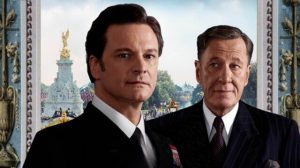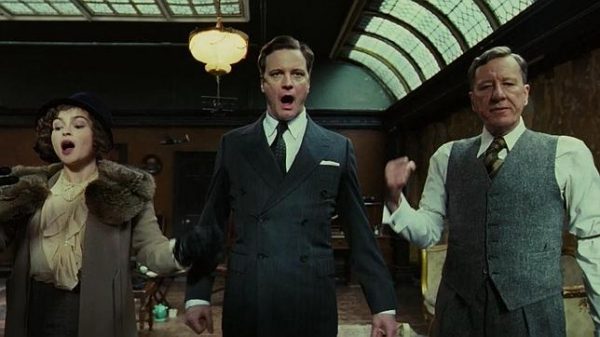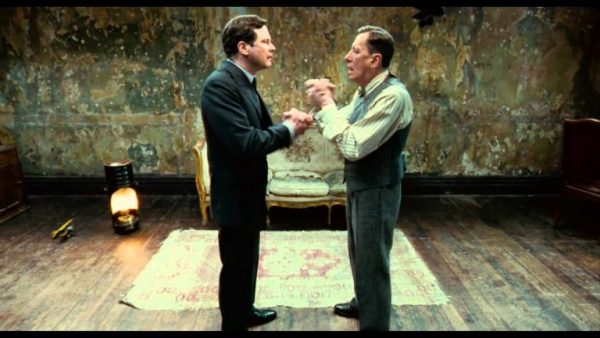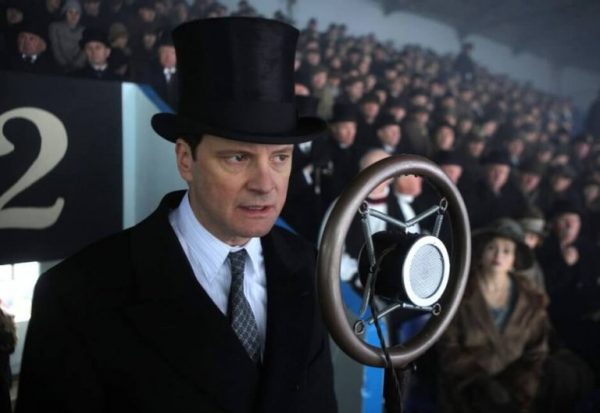The King's Speech and communication disorders


Written and verified by the film critic Leah Padalino
The King’s Speech is a British film from 2010 directed by Tom Hooper and starring Colin Firth, who won the Academy Award for Best Actor/Actress thanks to his performance of George VI, and starring also Geoffrey Rush and Helena Bohnham Carter. The movie was received with great reviews in which mainly the quality of the actors’ performances were praised. But apart from their brilliant work, we should highlight the importance of the outfits and the cinematography that transported us to the era of King George VI.
The King’s Speech, the story of a stutter
The King’s Speech brings us closer to the most private life of a historic character: King George VI of United Kingdom, and it does so in a majestic way. It’s impeccable script ans its high artistic and cinematographic quality made the film win an Oscar for Best Screenplay, among others. It is definitely an excellent piece of art that brings us closer to a forgotten problem in films: stuttering.
Through a historical character, we submerge ourselves in the insecurity and anxiety that conquers the people who suffer from this communication disorder. The fear of public speaking, the anxiety that it conveys and the rudimentary techniques of that era make George VI an insecure man, filled with fears. Ghosts that will make him feel incapable of giving out a speech at the level of his political position, and eventually as a king.
With the help of a speech therapist, Lionel Logue, George VI starts a therapy that, more than helping him with his communication problem, makes him engage in a strong friendship with Logue which allows him to unravel his deepest fears. At the same time, the viewers of the film see a more humane side of royalty and enjoy the challenges that Logue proposes, while being introduced not only to the problems of being a stutterer, but also to the history of the 20th century. Not too startling, but elegant and pleasant: this is The King’s Speech, a movie that, ironically enough, leaves us speechless.
George VI and Lionel Logue
George VI, known as Bertie by his family, became king unexpectedly: he was the second son of King George V and therefore, it was his older brother, Edward VIII, who should have ascended to the throne and who did in fact reign for a short period of time. His education was strict and worthy of British royalty, but he always knew he wouldn’t rule and hence, the pressure and responsibility always fell on his older brother.
His first communication problems had already appeared during his childhood, as it happens with most kids, around 4 or 5 years old. His position as Duke of York, son of the king and member of the British royal family put him in situations in which he had to give speeches in public events that aggravated his situation: anxiety made his stuttering even worse. He experienced the fear of speaking in public and lots of insecurities, and tried with many doctors and methods that promised to cure his stuttering condition, without success.
Lionel Logue however did not have a degree in medicine but during his early life in Australia, he got a degree in rhetoric and performing arts, and after World War I he dedicated himself completely to being a speech therapist. He started working in London, where the Duke of York found him.
Logue diagnosed Bertie with a deficient coordination between the larynx and the diaphragm and this helped Bertie overcome his stuttering thanks to relaxation exercises, tongue twisters and other less frequent practices. Eventually, thanks to his recognition, he became a founding fellow of the Royal College of Speech and Language Therapists in 1944.

In the film, we follow the therapy carried out by Logue and the accomplishments of the future King. The therapy sessions ended up becoming a great friendship that lasted their whole lives, Bertie finds in him an ally, someone he can trust and share his greatest fears with.
Therapy is not based solely on gargling or introducing pebbles in the mouth, as other doctors suggested, but it’s about discovering what caused Bernie to lose his voice.
At first, the duke shows himself reluctant to Logue’s methods, he’s not willing to be treated as a common man and wants to be called “His Royal Highness”, however Logue calls him Bertie, just like his closest relatives, refusing to give him a special treatment.
Finally, Logue earns his trust and we discover Bernie’s sad past, a childhood filled with bullying, with the death of one of his brothers and one in which he couldn’t be himself. His strict education and the harsh demands of the royalty made George VI a self-conscious man, incapable of giving a speech, and he was even forced to use his right hand when he was left-handed.
The King’s Speech, besides deepening in this communication disorder, shows us the hardest part of royalty and of being a public figure since birth. At the same time, the friendship between both characters makes George VI get closer to the reality of his people, to the lives of the ones he rules. As he himself states in one of his first sessions: his knowledge of the world is non-existent, he only knows life inside the palace.

The King’s Speech, the voice of the people
David Seidler, author of the script, suffered from stuttering in his childhood and found George VI inspiring and relatable. That is why he decided to research how he overcame his condition and to talk to Logue’s son, that shared with him some of his father’s notebooks.
Plus, one of his grandsons, Mark Logue, wrote a book called “The King’s Speech: How one man saved the British Monarchy” that inspired the movie’s title. The project got delayed for a few years until 2010, when we could finally appreciate the marvelous final outcome.
Thanks to the great quality of the film and of its performers, we now have the opportunity to get closer to this royal figure, a stuttering man that became the voice of an empire in a very delicate moment, just when WWII was about to burst.
A moment in which it was crucial that leaders had the charisma to convey calmness to their citizens, a moment in which George VI had to face his greatest fears and take control of an unexpected situation: becoming King of the British Empire.

Can a stutterer become a great public speaker? Demosthenes, mentioned in the film, already did with great effort in Ancient Greece. George VI, thanks to Logue’s relentless help and the support of his wife, was able to transmit the calmness that the British so desperately needed.
In one scene of the movie, we can see George VI hearing Hitler’s speech and although he doesn’t understand the language, he looks insecure when he sees Hitler’s charisma in public.
The scenes of the speeches are so real that we can almost feel the anxiety and the agony of the king in front of a microphone, standing in front of the critical gaze of his audience. The King’s Speech is a magnificent piece that takes us in a trip to the past and invites us to meet one of the most common fears.
“Easy when you know how.”
-The King’s Speech-
This text is provided for informational purposes only and does not replace consultation with a professional. If in doubt, consult your specialist.








